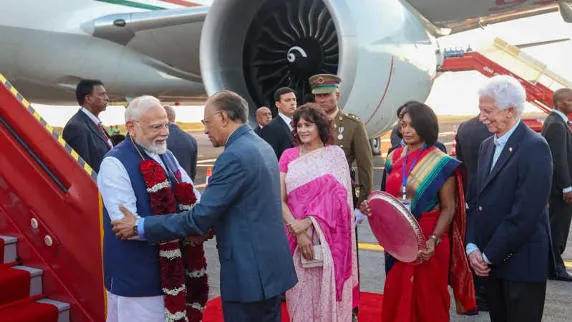India, the world’s largest democracy and a diverse tapestry of cultures, traditions, and languages, has long been revered for its rich history, ancient philosophies, and a legal system deeply rooted in its cultural ethos. However, as the nation strides forward in the 21st century, it finds itself at a crucial juncture in the realm of justice and dispute resolution.
In the face of these challenges, a quieter but increasingly significant revolution has been taking place, promising to reshape the way conflicts are settled in India. This revolution is mediation, a process that offers a more efficient, cost-effective, and harmonious approach to dispute resolution. It is in the embrace of mediation that India finds the promise of unlocking justice for its citizens and redefining its legal landscape.
The Indian judiciary, revered for its dedication to justice, has been grappling with an ever-expanding caseload. Courts, brimming with pending cases, have led to agonizing delays, sometimes stretching for years or even decades. For those seeking resolution, the corridors of justice have often felt like an endless maze. In this backdrop, mediation emerges as a beacon of hope, a bridge between adversarial litigation and constructive dialogue.
Mediation is a process where disputing parties come together, facilitated by a neutral third party, to engage in open and confidential discussions aimed at finding mutually agreeable solutions. Unlike the courtroom drama depicted in countless legal films, mediation offers a non-adversarial space where individuals, businesses, and communities can have their voices heard without the adversarial clash that litigation often entails.
The advantages of mediation are multifaceted, touching on the core issues that ail the current dispute resolution system in India. Speed and efficiency are hallmarks of mediation. In a country where court cases often drag on for years, if not decades, mediation offers the promise of swift resolution, measured not in years but in weeks or months. This timeliness is particularly crucial in commercial disputes, where fortunes are made and lost with each passing day.
The financial implications of litigation are another pressing concern. The cost of legal battles, replete with attorney fees, court expenses, and ancillary costs, can be crippling for individuals and businesses alike. Mediation steps in as a cost-effective alternative, offering substantial savings while ensuring that justice remains accessible to a broader cross-section of society.
Confidentiality and privacy, often overlooked in the legal process, assume a central role in mediation. Court proceedings are inherently public, exposing sensitive information and disputes to scrutiny. Mediation, in contrast, safeguards confidentiality, assuring parties that their discussions will remain confidential and protected. This environment encourages honest and open dialogue, essential for effective dispute resolution.
Flexibility and control empower parties in mediation. Unlike court-imposed decisions, mediated agreements are products of mutual collaboration. This flexibility is especially pertinent in a country as diverse as India, where norms, customs, and expectations can vary widely. Mediation allows for tailored solutions that accommodate these variations, fostering a sense of ownership over the resolution.
In a society deeply rooted in relationships and community ties, mediation excels in preserving these bonds. Litigation, on the other hand, often results in strained relationships and bitterness between parties. Mediation, on the other hand, focuses on finding common ground and resolving disputes amicably. By doing so, it not only serves the cause of justice but also fosters harmony within communities, which is of paramount importance in the Indian cultural context.
The emotional toll of litigation is undeniable. Prolonged legal battles can lead to stress, anxiety, and emotional exhaustion for those involved. Mediation offers a less adversarial approach, reducing the emotional strain on parties. In mediation, individuals are encouraged to express their concerns and feelings openly, which can lead to a more cathartic and less traumatic experience. This reduced emotional impact is not only beneficial for the parties but can also contribute to a healthier mental well-being among all those involved.
Furthermore, mediated agreements often have a higher rate of compliance. Parties are more likely to adhere to solutions they have helped create, reducing the burden on enforcement agencies and the courts, ultimately enhancing the efficiency of the entire legal system.
However, while the advantages of mediation in India are clear, challenges remain. Cultural norms, traditions, and the ingrained perception of litigation as the primary means of dispute resolution must be addressed. Mediation needs to be integrated further into the legal system, perhaps even made mandatory in certain cases, to unlock its full potential. Additionally, the need for well-trained mediators and standardized processes cannot be overstated.
One of the most glaring issues plaguing India’s judicial system is the inordinate delay in resolving cases. Litigants often find themselves waiting for justice for years, if not decades. Mediation offers a distinct advantage in this regard. It is a process characterized by its speed and efficiency. Unlike protracted court battles, where cases can drag on indefinitely, mediation often leads to swift resolutions. Disputes that may have taken years to be decided in court can be successfully mediated within weeks or months. This expedited process is particularly valuable in commercial disputes, where time is of the essence, and lengthy legal battles can have dire financial consequences.
The prohibitive cost of litigation is a significant deterrent for many seeking justice in India. Legal fees, court expenses, and the protracted nature of court proceedings can impose a heavy financial burden on litigants. In contrast, mediation offers a cost-effective alternative. The reduction in legal fees, court costs, and the accelerated resolution process make mediation a financially viable option. It ensures that justice remains accessible to a broader cross-section of society, regardless of their financial means.
Privacy is an often overlooked aspect of the legal process. Court hearings are inherently public, exposing sensitive information and disputes to public scrutiny. In contrast, mediation places a premium on confidentiality and privacy. Parties involved in mediation can have candid discussions knowing that the details of their disputes will remain confidential and protected. This environment encourages a more honest and open dialogue, allowing for the resolution of contentious issues that might otherwise be concealed in a courtroom setting. Mediation empowers the parties involved by granting them greater control over the outcome. Unlike court-imposed decisions, mediated agreements are crafted through mutual collaboration. This flexibility is especially pertinent in a diverse country like India, where norms, customs, and expectations can vary widely. Mediation allows for tailored solutions that accommodate these variations, fostering a sense of ownership over the resolution. In a society deeply rooted in relationships and community ties, mediation excels in preserving these bonds. Litigation, with its adversarial nature, often leads to strained relationships and bitterness between parties. Mediation, on the other hand, focuses on finding common ground and resolving disputes amicably. By doing so, it not only serves the cause of justice but also fosters harmony within communities, which is of paramount importance in the Indian cultural context. The emotional toll of litigation is undeniable. Prolonged legal battles can lead to stress, anxiety, and emotional exhaustion for those involved. Mediation offers a less adversarial approach, reducing the emotional strain on parties. In the mediation process, individuals are encouraged to express their concerns and feelings openly, which can lead to a more cathartic and less traumatic experience. This reduced emotional impact is not only beneficial for the parties but can also contribute to a healthier mental well-being among all those involved. One of the less-discussed but equally critical advantages of mediation is the higher likelihood of compliance with the agreements reached. Parties are more likely to adhere to solutions they have had a hand in creating. This reduces the burden on enforcement agencies and the courts, freeing up judicial resources for other cases and promoting a sense of trust in the legal system.
While the advantages of mediation in India are clear, challenges remain. Cultural norms, traditions, and the ingrained perception of litigation as the primary means of dispute resolution must be addressed. Mediation needs to be integrated further into the legal system, perhaps even made mandatory in certain cases, to unlock its full potential. Additionally, the need for well-trained mediators and standardized processes cannot be overstated.
The Indian judiciary has been grappling with an overwhelming caseload for years. Courts are inundated with cases, leading to immense delays and mounting frustration. Mediation serves as an effective tool to decongest the court system. By diverting suitable cases to mediation, courts can focus on more complex matters, reducing the backlog and ensuring that justice is delivered more promptly.
Beyond individual cost savings, mediation can yield broader economic advantages for India. By reducing the financial strain on businesses tied up in lengthy litigation, mediation promotes economic growth. It minimizes disruptions to business operations and preserves valuable resources that would otherwise be expended on legal battles. Mediation promotes a culture of resolution and collaboration, which can have far-reaching implications for society. As more individuals and businesses embrace mediation, this mindset permeates society, fostering a climate where disputes are seen as opportunities for resolution rather than protracted battles. This cultural shift aligns with India’s values of harmony and cooperation.
The traditional court system consumes significant public resources, from the salaries of judges and court staff to the construction and maintenance of court facilities. Mediation can significantly reduce this burden. It requires fewer resources to operate, making it a cost-effective method for the government to provide access to justice.
The Author is Legal Researcher and Third Year Law Student at University of Lucknow.























